Teen 'Brutally Beaten' By Iranian Authorities - US National Security Advisor

Jake Sullivan, the US National Security Advisor, has blamed the Iranian authorities for the death of a 16-year-old in the hands of hijab enforcers.

Jake Sullivan, the US National Security Advisor, has blamed the Iranian authorities for the death of a 16-year-old in the hands of hijab enforcers.
In his statement on X, Sullivan said, "I am deeply saddened to learn of the tragic passing of Armita Geravand, who was brutally beaten by Iran's morality police for not conforming to public hijab mandates. The state-sponsored violence against its own citizens in Iran is abhorrent and underscores the vulnerability of the regime."
The incident occurred on October 1 when Armita fell into a coma after an altercation with hijab enforcers in the Tehran subway. Despite the Iranian government's efforts to obscure the details of the confrontation, it appears that she was forcibly pushed by a female agent, resulting in a severe head injury. Her death was subsequently confirmed by Iranian state media on Saturday.
There has been a national outpouring of grief for her death which echoed the death of Mahsa Amini last year in morality police custody. Videos received by Iran International showed protesters in Ekbatan, located in the west of Tehran, chanting slogans like "Death to the dictator" and "Death to Khamenei the murderer" on Sunday night. Similar protest slogans were reported in other parts of Iran on the same night, including Mashhad, Shiraz, Karaj, and Sari.
Additionally, Iranians living abroad have shown their solidarity by participating in gatherings in Toronto and London, where they voiced their opposition to the continued repressive policies of the Islamic Republic.
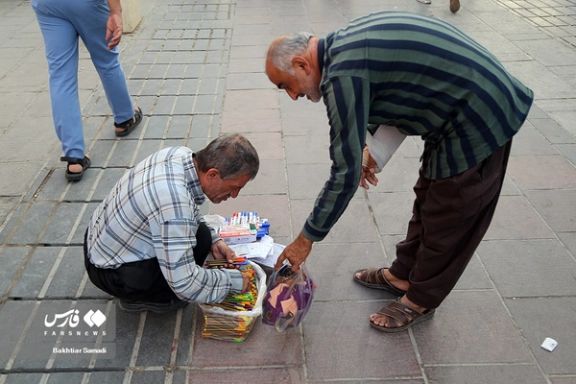
Iran’s government has proposed a 20 percent pay raise for civil servants next calendar year (starting March 21), despite a rampant inflation of over 46 percent.
Experts say the low increase proposed by the government reflects its need to reduce expenditures and to avoid a higher budget deficit, which is at least 50 percent.
According to a report prepared by the parliament’s research center that was released last week, this year’s budget deficit may amount to $13.5 billion, or 30 percent, but independent analysts believe the deficit is closer to half the budget. In the current year the government has failed to secure half of the revenues expected from oil and gas sales and the same trend is expected to continue in the coming year.
Budget deficit amounted to $10 billion in the first four months of the current year, the report said.
The proposed small increase in civil servants’ salaries is worrisome to workers, who need to afford basic necessities amid the high inflation environment. Most of these workers are civil servants or employed by government-owned and pseudo-governmental companies.
Iran witnessed several rounds of anti-regime protests and workers strikes since 2017, and the economic crisis is believed to be the main factor in driving hopeless young people to rebel.
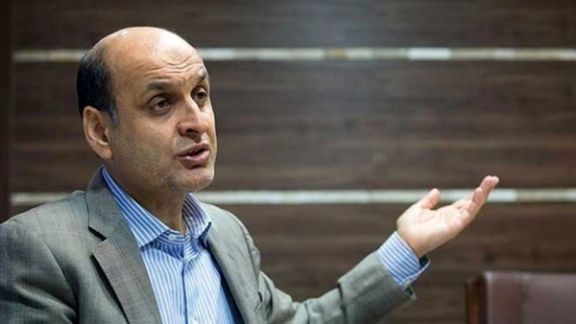
The Statistics Center of Iran (SCI) and the Central Bank claim that the rate of annual inflation has dropped to 45.5 percent, nearly the same level as a year ago, and the economic growth rate rose to above six percent between April and July. But official figures tend to underreport bad news and cannot be independently verified. One thing which is clear is that food prices have risen much faster than the official inflation rate, in some instances hitting 100-percent in 2022.
Many reports by local media say prices for some food items has also doubled in 2023, since the same time last year. For instance, based on the figures released by the SCI, the price of mutton and beef have risen by 151 and 132 percent respectively this year.
Economist Hadi Haghshenas, speaking to local media, expressed concern about the “alarming” rate of inflation and said the reason for the small drop in the rate of inflation is a drastic reduction in people’s purchasing power rather than economic improvement as the share of food and housing in the basic commodities basket has risen from around 50 percent to between 70 and 80 percent.
People’s actual experience of the economic realities is in contradiction with the figures that the government announces, he told the reformist Shargh daily, adding that the budget deficit, high inflationary expectations, and “ambiguity in foreign policy” all indicate that improvement in economy should not be expected.
Sanction imposed by the United States since 2018 have plunged Iran into economic crisis, but efforts by the Biden administration to resolve differences with Tehran over its nuclear program have failed so far.
Experts say the chasm between the rich and the poor is increasing, and the middle class is vanishing fast despite the promises of President Ebrahim Raisi’s government to “increase social justice”.
High inflation of over 40 percent in the past few years has been taking its toll on the poor and the middle class who are increasingly finding it impossible to afford some basic needs, particularly food and housing, as the increase in salaries and wages has not kept up with inflation. The share of education and leisure have accordingly dropped to a record low in the past few years.
Naser Rahchamani, a former member of the Supreme Labor Council, a body made of representatives of workers, businesses and the government, which is responsible for setting the minimum wage of workers, says the society has hugely become poorer this year and the purchasing power of workers has drastically dropped in comparison with previous years.
“It seems that the government has shut its eyes to the livelihood problems of the workers who constitute half of the country’s population [with their families],” Rahchamani told the reformist Etemad newspaper.
“Production did not increase…and inflation remained high,” he said while stressing that the cost of sanctions weighed on the shoulders of workers who bore the brunt of high prices.
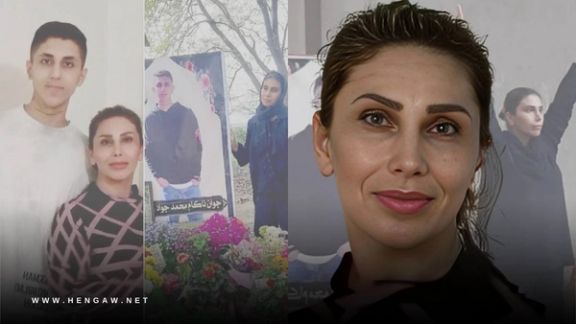
Mahsa Yazdani, the mother of Mohammad Javad Zahedi, one of the casualties of Iran’s nationwide protests in 2022, has been sentenced to 13 years in prison.
Yazdani was sentenced in the Revolutionary Court of Sari, northern Iran, under charges including insulting sanctities, endangering state security and insulting the Supreme Leader of the Islamic Republic, Hengaw Human Rights organization reported.
Under the law on the combination of sentences, her most severe punishment, which is five years in prison, will be enforceable.
Mitra Zahedi, the daughter of Yazdani, shared in an Instagram story: "What will happen to my three-year-old brother? Who is responsible for all this injustice?"
Mohammad Javad Zahedi was killed by the gunfire of security forces during the nationwide protests in Sari at the age of 20 in September last year.
Since September 2022, when widespread anti-regime protests broke out, security forces have killed well over 500 civilians and severely wounded hundreds. Many young protesters were targeted by shotgun pellets in the face and lost one or both eyes. The regime also arrested 22,000 people, including journalists and hundreds of minors.
Yazdani has always been the voice for justice for her slain son in the past year and has been alongside other families of the victims of the protests.
Initially detained by security forces in Sari, she was transferred to an unknown location on August 22 before being released on bail on September 25. An immediate sentence has been issued for her.
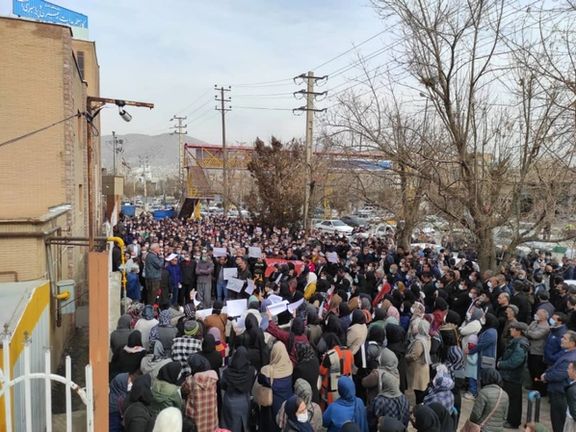
The Iranian Teachers' Association has released a statement condemning the death of Armita Geravand, who lost her life after a confrontation with hijab enforcers.
The association's statement acknowledges Armita, along with Mahsa Amini and other young girls, as “courageous fighters who took a stand against the authoritarian regime's ideological policies. Their unwavering resilience came at the ultimate cost of their lives.”
On October 1, Armita, 16, fell into a coma after an encounter with hijab enforcers in the Tehran subway. While the government has attempted to obscure the details of the incident, it appears that she was pushed by a female agent, resulting in a severe head injury.
Security measures were taken to prevent the dissemination of information or photographs or CCTV footage from the scene at Tehran's Fajr Hospital. She was subsequently declared brain dead and died in hospital on Saturday.
On Monday, the association, which stands bravely against the Islamic regime in the face of continued oppression of dissenting voices, including targeting academia, said: “Armita's case is one of several in which young girls have paid a heavy price for their defiance in advocating for optional hijab."
It stated that the option to wear hijab, mandated by the regime since its formation in 1979, "plays a pivotal role in advancing the democratic process of the Iranian people".
The group said: "Gender equality is an essential component of democracy, and the pursuit of optional hijab represents a realistic and achievable aspiration, vital for the realization of this democratic process."
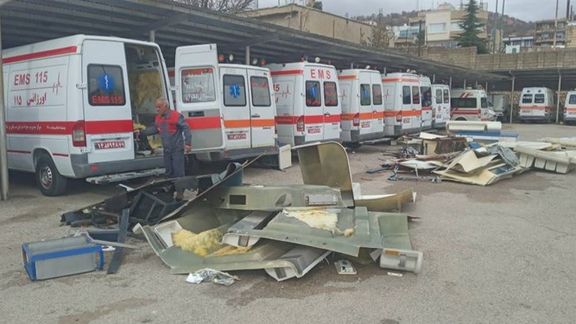
A top official in Iran’s Emergency Services has told local media that 3,000 ambulances used by his department are “worn-out,” amid a general financial crisis.
Jafar Miadfar in a press conference on Sunday said that government has promised to acquire 500 new ambulances by March 2024, and “some promises” have been made for 500 more.
The Iranian government has been facing budgetary problems for more than a decade, when first the United Nations and later the United States imposed economic sanctions, mainly to rein in Iran’s nuclear program. US sanctions imposed since 2018 have substantially reduced government oil export revenues that constitute more than half its annual budget.
Miadfar complained about the current budget, which has only increased the wages of emergency workers but has neglected other needs, such as equipment, vehicles, fuel and supplies.
He explained that 26,000 people work for the Emergency Services and they render assistance to an average of 2.5 million people annually.
Similar difficulties exist in other areas, such city transportation, hospitals and school facilities. Most of Tehran’s 7,000 city buses are also considered unfit for service since 2017, and the government has been unable to replace them, even with used vehicles from more affluent countries.
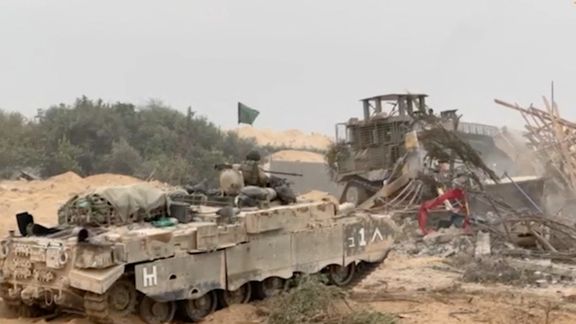
Israeli forces carried out airstrikes on targets in Syria and Lebanon Sunday evening, affiliated with the Lebanese Hezbollah and Iran's IRGC forces.
The Israel Defense Forces (IDF) confirmed the operations through posts on X, claiming that they had struck Hezbollah facilities in Lebanon.
The attacks came only hours after Hezbollah announced that its Secretary General Hassan Nasrallah would deliver a speech this Friday.
They first teased the news with a 10-second video, in which a figure resembling Nasrallah is seen walking past a Hezbollah logo on a wall. The mysterious clip went viral as viewers tried to decipher it.
Speculation is rife that Nasrallah's upcoming speech may involve some kind of declaration of war against Israel.
Hezbollah, backed by the regime in Iran, boasts an extensive stockpile of rockets, which makes it a far more formidable military force compared to Hamas.
On Sunday, before Israel confirmed striking Syria and Lebanon, reports had emerged that Hezbollah rockets had breached Israel’s missile defense system (Iron Dome), hitting a residential building in northern Israel.
The Biden administration has been trying hard to prevent a broader conflict, which would force it to enter yet another war in the Middle East exactly one year before the 2024 elections.
Critics of Biden’s foreign policy maintain that his reluctance to act tough (against Iran, in particular) would make the situation even more difficult for the US.
“What we need to do is send a clear and forceful message,” said Senator Tom Cotton on Sunday, “whether it’s striking IRGC officials in Syria or in Iraq, or striking directly at Iranian facilities inside Iran to make it clear that we won’t tolerate attacks on Americans throughout the region by Iranian proxies.”
Last week, the Pentagon revealed that American troops in Syria and Iraq had come under repeated attacks from Iran proxies in the week between 17 and 24 October.
Senator Cotton told Fox News that the Biden administration should learn from Donald Trump in assassinating Qassem Soleimani in January 2020.
“If we don’t do something like that,” he warned, “these attacks are going to continue until Americans are killed.”
Iranian officials have become increasingly boastful since Hamas attacked Israel on October 7, killing at least 1,400 and taking more than 200 hostage.
On Sunday, Iran's President, Ebrahim Raisi, took a typically brazen line, suggesting that Hamas forces were repelling the Israelis in Gaza –and that would be “a defeat heavier than the initial one for Israel.”
Reports from northern Gaza described fierce air and artillery strikes Sunday evening, affecting areas near Gaza City's Shifa and Al-Quds hospitals.
The Palestinian Red Crescent reported receiving warnings from Israeli authorities, urging the immediate evacuation of Al-Quds hospital, which currently shelters approximately 14,000 people.
International organizations say Gaza is facing an acute humanitarian crisis. The head of the UN agency for Palestinian refugees (UNRWA) has warned that "many more will die" in Gaza if the Israeli bombing and siege continues.
Calls for a humanitarian ceasefire have intensified in the past week. But Israel has rejected all such calls and announced that its ground operation would continue unabated.
Hamas officials say Israeli airstrikes on Gaza have so far killed more than 8,000 Palestinians, at least half of them women and children. These numbers cannot be independently verified.
The situation is dire as basic necessities like water and food have been cut off from the densely populated enclave of 2.2 million. Israel has allowed limited aid to enter in the past few days.
On Sunday, another 33 trucks were let in, containing water, food and medicine. But the humanitarian workers on the ground say the aid received so far falls desperately short of needs.